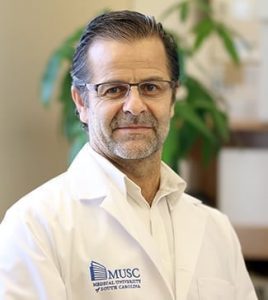MUSC recruits renowned cancer researcher to direct Hollings Cancer Center
January 12, 2017The Medical University of South Carolina has named Gustavo W. Leone, Ph.D., director of the Hollings Cancer Center (HCC). His appointment to South Carolina’s only National Cancer Institute-designated (NCI) center begins March 1, 2017. In addition to his strong leadership background, Leone is a preeminent cancer research expert with a longstanding record of pursuing innovative and interdisciplinary approaches to cancer research while mentoring and supporting the next generation of cancer researchers.
As director, Leone will oversee the patient care arm of the Hollings Cancer Center as well as lead cancer-related research efforts in order to achieve and promote transdisciplinary and translational collaborative research. HCC includes more than 120 faculty-level cancer scientists with an annual research funding portfolio of $44 million. A primary goal for Leone will be to support and enhance the infrastructure key to the center’s prestigious NCI-designated status and to build programming and recruitment efforts to attain NCI Comprehensive Cancer Center status.
Leone earned his doctoral degree from the University of Calgary and completed a postdoctoral fellowship at Duke University in 1998 before joining The Ohio State University (OSU) as an assistant professor at OSU’s NCI-designated James Comprehensive Cancer Center. Leone advanced to full professor in molecular genetics in 2011 and held the Klotz Chair in Cancer Research. In his leadership positions as director of the Solid Tumor Biology Program and associate director for basic research, he was instrumental in the rise of the James Comprehensive Cancer Center to the top tier of all cancer centers. Leone also expanded mentoring, recruitment, and collaborative research efforts as a founding member of the Pelotonia Fellowship Program in Cancer Research, with specific goals to train basic and translational researchers across the cancer continuum.
Leone will continue to conduct laboratory and translational research at MUSC, focusing on identifying how disruption of critical cell cycle regulatory pathways contributes to uncontrolled cell growth, a hallmark of cancer. Currently his laboratory group focuses on studying how genes outside the tumor cell affect the community of cells around a cancer cell, a research area that may reveal new cancer treatment strategies. He has authored more than 120 peer-reviewed publications and has received numerous recognitions for his contributions to cancer research. Mentoring the next generation of cancer researchers is a passion for Leone, who has an impressive track record of successful mentorship that includes not only numerous faculty but also hundreds of trainees ranging from college undergraduates to postdoctoral fellows.
About Hollings Cancer Center
The Hollings Cancer Center at the Medical University of South Carolina is a National Cancer Institute-designated Cancer Center and the largest academic-based cancer research program in South Carolina. The cancer center is comprised of more than 120 faculty-level cancer scientists with a research funding portfolio of $44 million and a dedication to reducing the cancer burden in South Carolina. Hollings offers state-of-the-art diagnostic capabilities, therapies and surgical techniques within multidisciplinary clinics that include surgeons, medical oncologists, radiation therapists, radiologists, pathologists, psychologists and other specialists equipped for the full range of cancer care, including more than 200 clinical trials. For more information, please visit www.hollingscancercenter.org.
About MUSC
Founded in 1824 in Charleston, The Medical University of South Carolina is the oldest medical school in the South. Today, MUSC continues the tradition of excellence in education, research, and patient care. MUSC educates and trains more than 3,000 students and residents in six colleges (Dental Medicine, Graduate Studies, Health Professions, Medicine, Nursing, and Pharmacy), and has nearly 13,000 employees, including approximately 1,500 faculty members. As the largest non-federal employer in Charleston, the university and its affiliates have collective annual budgets in excess of $2.2 billion, with an annual economic impact of more than $3.8 billion and annual research funding in excess of $250 million. MUSC operates a 700-bed medical center, which includes a nationally recognized children’s hospital, the Ashley River Tower (cardiovascular, digestive disease, and surgical oncology), Hollings Cancer Center (a National Cancer Institute-designated center), Level I trauma center, Institute of Psychiatry, and the state’s only transplant center. In 2016, U.S. News & World Report named MUSC Health the No. 1 hospital in South Carolina. For more information on academic programs or clinical services, visit musc.edu. For more information on hospital patient services, visit muschealth.org.














